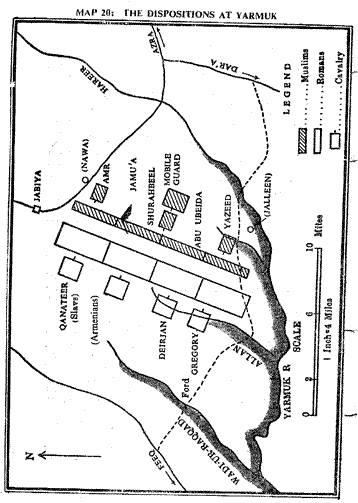|
Thus the magnificent army
of Caesar was arrayed for battle.
When Khalid returned from his talks with
Mahan, he informed Abu Ubaidah and the other generals that there
would be no more talks, that the issue would be decided by the sword,
that the battle would begin the next day. Abu Ubaidah took the news
with his usual stoical acceptance of the will of Allah. As Commander-in-Chief
he would organise the army for battle and conduct the operation
according to his tactical judgement. His military skill was not,
however, very great, and he knew it. Khalid knew it, and most of
the officers of the army knew it. Abu Ubaidah would fight the battle
in a sensible manner, and would react to changing tactical situations
like the good, steady general that he was. But with the enemy four
times superior in strength, soundness and common sense were not
enough. A much finer quality of generalship was required for this
battle, and Khalid decided to offer his services to act as the real
commander in battle.
"O Commander", said Khalid
to Abu Ubaidah, "send for all the commanders of regiments
and tell them to listen to what I have to say." 1
Abu Ubaidah got the point. He himself could
wish for nothing better. He at once sent an officer to call the
regimental and corps commanders to his headquarters; and the officer
rode to all the commanders, conveying the message: "Abu
Ubaidah commands that you listen to whatever Khalid says and obey
his orders." 2 The officers understood
the meaning of the message and gathered at the headquarters to receive
the orders of Khalid. On this tactful note the command of the army
was taken over by Khalid, and everyone was satisfied with the arrangement.
Abu Ubaidah remained the nominal commander
and somewhat more than that. He continued to deal with matters of
administration, led the prayers and saw to various other details
of command. He also gave certain orders when his ideas did not clash
with the plans and orders of Khalid. But for the purpose of battle,
Khalid was now the commander of the Muslim army in Syria, and would
remain so until this battle was over.
Khalid immediately set about the reorganization
of the army into infantry and cavalry regiments within each corps.
The army consisted of 40,000 men, of which about 10,000 was cavalry.
This force was now organised by Khalid into 36 infantry regiments
of 800 to 900 men each, three cavalry regiments of 2,000 horses
each and the Mobile Guard of 4,000 horsemen. The commanders of the
cavalry regiments were Qais bin Hubaira, Maisara bin Masruq and
Amir bin Tufail. Each of the four corps had nine infantry regiments,
which were all reformed on a tribal and clan basis, so that every
man would fight next to well-known comrades. Much of Khalid's corps
of Iraq was absorbed in the other four corps, while the best of
it remained with him as the Mobile Guard.
The army was deployed on a front of 11 miles
corresponding roughly to the front of the Roman army. The army's
left rested on the Yarmuk River, a mile forward of where the ravine
began, while it's right lay on the Jabiya road. 3
On the left stood the corps of Yazeed and on the right the corps
of Amr bin Al Aas, and each of these flanking corps commanders was
given a cavalry regiment under command. The centre was formed by
the corps of Abu Ubaidah (left) and Shurahbil (right). Among the
regimental commanders of Abu Ubaidah were Ikrimah bin Abi Jahl and
Abdur-Rahman bin Khalid. Behind the centre stood the Mobile Guard
and one cavalry regiment as a central reserve for employment on
the orders of Khalid. At any time when Khalid was busy with the
conduct of the battle as a whole, Dhiraar would command the Mobile
Guard. Each corps pushed out a line of scouts to keep the Romans
under observation. (For the dispositions of the two armies, see
Map 20 below)

Compared with the Romans, the Muslim army
formed a thin line, only three ranks deep, but there were no gaps
in the ranks which stretched in unbroken lines from edge to edge.
All the spears available in the army were issued to the front rank,
and in battle the men would stand with the long spears at the ready,
making it impossible for an assailant to get to grips without braving
the frightening points of the spears. The archers, most of whom
were Yemenis, stood interspersed in the front rank. On the first
approach of the enemy the archers would open up and bring down as
many of the Romans as possible. As the assailants clashed with the
Muslims, they would be killed with spears, and thereafter the men
would draw their swords.
1. Waqidi: p. 129.
2. Ibid.
3. In terms of present-day geography, the
Muslim line started from about a mile west of Nawa and went south-south-west
to over the Hill of Jamu'a, then between Seel and Adwan, then between
Sahm-ul-Jaulan and Jalleen, to just short of the Yarmuk.
|
